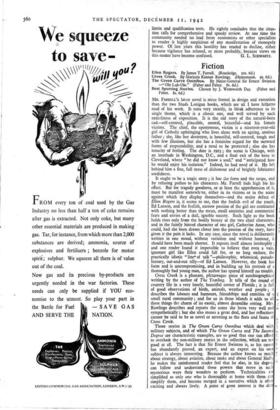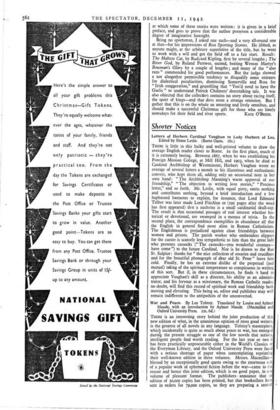Fiction
Ellen Rogers. By James T. Farrell. (Routledge. los. 6d.) Cross Creek. By Marjorie Kinnan Rawlings. (Heinemann. 9s. 6d.) The Green Curve Omnibus. By Major-General Sir Ernest Swinton —"Ole Luk-Oie." (Faber and Faber. 8s. 6d.) Best Sporting Stories. Chosen by J. Wentworth Day. (Faber and Faber. 8s. 6d.) MR. FARRELL'S latest novel is more formal in design and execution than the two Studs Lonigan books, which are all I have hitherto
read of his work. It runs very straitly, in bleak adherence to its single theme, which is a classic one, and well served by such orderliness of exposition. It is the old story of the natural-born cad—self-centred, plausible, amoral, beautiful—and his female victims. The chief, the eponymous, victim is a nineteen-year-old girl of Catholic upbringing who lives alone with an ageing, anxious father ; she like her destroyer, is beautiful, self-centred, tough and with few illusions, but she has a feminine regard for the outward forms of respectability, and a need to be protected' also she has tenacity of feeling. The date is 5925 ; the scene is Chicago, with an interlude in Washington, D.C., and a final exit of the hero to Cleveland, where "he did not know a soul," and "anticipated how he would enjoy his isolation." Indeed, he had need of it. He left behind him a fine, full mess of dishonour and of brightly fabricated sordidness.
It ought to be a tragic story ; it has the form and the scope, and by refusing pathos to his characters Mr. Farrell bids high for his effect. But for tragedy goodness, or at least th.t. apprehension of it, must be manifest somewh-re either in its victims or in the scene against which they display ;hemselves—and the major defect of Ellen Rogers is' it seems to me, that the foolish evil of the youth, Ed Lanson, and the fcolish, narrow passion of the girl are contrasted with nothing better than the mean, small anxieties and commercial fears and envies of a dull, ignoble society. Such light as the book holds rises only from the bodily beauty of the two chief characters, and in the faintly hinted character of one girl, Catherine Anne, who could, had she been drawn closer into the passion of the story, have given it the pain it lacks. In any case, since the novel is deliberately written in one mood, without variation and without humour, it should have been much shorter. It repeats itself almost intolerably ; and one reader found it impossible to believe that even a vain, ignorant girl like Ellen could fall for, or so long endure, the practically idiotic "line of talk "—philosophic, whimsical, pseudo- literary, out-and-out silly—of Ed Lanson. However, the book has form and is uncompromising, and in building up his portrait of a thoroughly bad young man, the author has spared himself no trouble.
Cross Creek is a pleasant, picturesque piece of autobiographical writing by the author of The Yearling. It tells of the round of country life in a very lonely, beautiful corner of Florida ; it is full of good observations of birds, animals, weather and people ; it describes the labours and humours, friendships and enmities of a small rural community ; and for us in these islands it adds to all these things the charm of its exotic, almost dreamlike setting. Mrs. Rawlings describes and reports the scene she loves very well and sympathetically ; but she also muses a great deal, and her reflections cannot be said to be as novel or arresting as the flora and fauna of Cross Creek. 3 Those stories in The Green Curve Omnibus which deal with military subjects, and of which The Green Curve and The Second t, Degree are characteristic examples, are so good that one can afford 1, to overlook the non-military stories in the collection, which are not ir good at all. The fact is that Sir Ernest Swinton is, as his career I, has abundantly proved, an expert, and an expert on his own subject is always interesting. Because the author knows so much about strategy, about aviation, about tanks and about General Staffs, he makes the uninformed reader feel that he also, in his degree, can follow and understand these powers that move in such mysterious ways their wonders to perform. Technicalities are simplified as only one who is thoroughly at home with them c.:n simplify them, and become merged in a narrative which is often exciting and always lively. A point of great interest is the date
at which some of these stories were written: it is given in a brief preface, and goes to prove that the author possesses a considerable degree of imaginative foresight.
Being no sportsman, I asked one such—and a very all-round one at that—for his impressions of Best Sporting Stories. He jibbed, as anyone might, at the arbitrary superlative of the title, but he went to work with a will and got the field off to a fair start. Result: The Maltese Cat, by Rudfard Kipling, first by several lengths ; The River God, by Roland Pertwee, second, beating Weston Martyr's Bowman's Glory by a couple of lengths ; and many of the "also rans " commended for good performances. But the judge showed a not altogether permissible tendency to disqualify some entrants for dialectical peculiarities, dismissing Somerville and Ross for "Irish exaggeration," and grumbling that "You'd need to have the Gaelic" to understand Patrick Chalmers' deerstalking tale. It was also objected that the collectiol contains no story about racing itself, the sport of kings—and that does seem a strange omission. But I gather that this is on the whole an amusing and lively omnibus, and should make a successful Christmas gift for those who are lonely
nowadays for their field and river sports. KATE O'BRIEN.



























 Previous page
Previous page